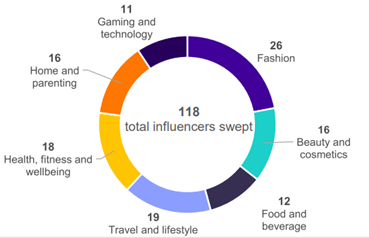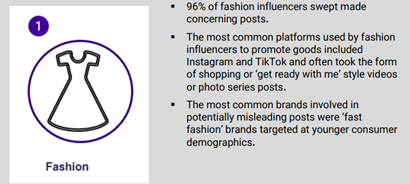This is getting serious. The ACCC has found signs of misleading social media advertising across all sectors influencers operate in and has given fair warning that it will conduct further assessments
The ACCC’s assessments:
- will not be limited to individual influencers but will also focus on the role of brands, advertisers, marketing firms and social media platforms in facilitating the misconduct of the influencers.; and
- will be followed by ‘various education, compliance, and potential enforcement activities.
This and more is contained in the latest ACCC report on digital platform services: Interim report 6: Report on social media services (released on 28 April 2023).
Chapter 5 of the report focuses on Influencers. These are some extracts (with page references).
Key Findings
- The influencer marketing industry is growing significantly.
- Influencers need to be clear if there are any commercial motivations behind their posts. A failure to disclose payment, or free products or services received from a brand, may mislead consumers into thinking testimonials are genuine and prevent them from making informed choices.
- Income streams earned by influencers on social media platforms can be uneven, and changes to platform algorithms and platform influencer partner programs can have a considerable impact on their ability to earn revenue.
- Influencers are often public figures and can face high rates of online harassment and bullying.
- Child influencers or ‘kidfluencers’ may be susceptible to greater online harm, including via online harassment, privacy breaches and a lack of labour protection. (p 159)
Who are influencers and what do they do?
Influencers generate and share content on social media services with other users, including their followers.
A survey conducted in 2022 estimates that there are 6 million ‘creators’ in Australia. While there are slight differences between the 2 terms, the term ‘influencer’ is used throughout this report to describe creators who showcase their content on social media platforms and, in some cases, monetise their efforts through memberships, subscriptions, digital tips, advertising, brand partnerships, endorsements, direct funding from platforms, and other forms of digital payment. (p 15, 159)
Influencer marketing (disclosure versus being authentic)
The influencer marketing industry is growing significantly. Estimates suggest that the global influencer marketing sector is expected to grow from US$6 billion in 2020 to US$24.1 billion by 2025. (p 15, 164)
In Australia, advertising (including influencer advertising on social media) should be clearly distinguishable from other content. It is important that influencers are clear if there are any commercial motivations behind their posts. This includes those posts that are incentivised, but are presented as impartial when they are not. (p 164)
Where an influencer accepts payment of money, or free products or services from a brand in exchange for them to promote that brand’s products of services, the relationship should be clear, obvious and upfront to the audience. It must also be expressed in a way that is easily understood (for example, #ad, Advert, Advertising, Branded Content, Paid Partnership, Paid Promotion). Less clear labels such as #sp, Spon, gifted, Affiliate, Collab, ‘thanks to…’, or merely mentioning the brand name may not be sufficient to clearly distinguish the post as advertising. (p 164, 165)
Influencers have incentives not to disclose endorsement deals or ‘overcommercialise’ as their advertising influence largely relies on their authenticity. The integration of advertising material with authentic posts can therefore create an incentive for brands and influencers not to label advertising clearly and prominently, because a feed with multiple obvious advertisements may be considered ‘inauthentic’ and off-putting to followers. (p 165)
The ACCC influencer sweep
On 23 January 2023 the ACCC launched a sweep aimed at identifying misleading endorsements and testimonials by social media influencers. The sweep concluded on 3 February 2023.
The focus of the sweep was to identify posts by social media influencers that contained potentially misleading reviews or endorsements, and which may cause consumer harm. (p 166)
Specifically, the harm is misleading, and deceiving consumers by:
- making incorrect statements or creating a false or misleading impression about a product, service or brand;
- omitting to disclose key information such as underlying commercial relationships, sponsorships or other incentives received to promote a product, service or brand; and/or
- disclosing advertising or sponsorships in posts, but not clearly or prominently enough for the ordinary consumer to notice or pay attention to. (p 167)
The ACCC is assessing whether these posts may be misleading or deceptive conduct in breach of the Australian Consumer Law. (p 167)
The ACCC swept a total of 118 influencers for signs of misleading social media advertising, in eight sectors.

Across the above sectors, the ACCC identified a total of 81% of influencer posts as concerning and in need of follow-up action. The overwhelming majority of these concerns related to:
- Influencers not properly disclosing whether they are receiving a payment, gift or other incentive in exchange for promoting a business in their posts. Common examples of this included influencers tagging brands in posts, product placement in photos or videos, vague disclosures (such as thanking brands) and the use of promotional/discount codes or website referral links in posts. Without explicit disclosure of this, a consumer may be misled into thinking it is a genuine endorsement.
- Influencers disclosing advertising but this disclosure is not clear or prominent. Examples of this included influencers using #ad, #gifted or #sponsored content labels at the bottom of lengthy captions, so consumers would be required to press ‘click more’ on posts to view these disclosures. Other posts contained disclosures that were hard to read or not noticeable (i.e., using #ad in small white font on a white background, or using variations on common disclosure tools such as #sponcon or without the hashtag). (p 169)
ACCC’s comments on fashion influencers:

ACCC looks to improve compliance
The ACCC warns that it will be conducting follow-up activities:
A key component of these follow-up activities will include industry engagement and guidance to improve compliance. Importantly, these follow-up activities will not be limited to addressing concerning conduct by individual influencers, but also focus on the role of brands, advertisers, marketing firms and social media platforms in facilitating misconduct. For example, where patterns have been identified in the brands, advertisers, marketing firms and platforms involved in concerning conduct during the sweep, we will also target these entities. (p 168)
Comment
The ACCC is following the same playbook in investigating influencers for their posts, as it is following in investigating businesses for greenwashing. This is from ACCC Media Release 17/23 (2 March 2023):
“The ACCC will be investigating a number of businesses for potential ‘greenwashing’, following an internet sweep which found more than half of the businesses reviewed made concerning claims about their environmental or sustainability practices.
Of the 247 businesses reviewed during the sweep, 57 per cent were identified as having made concerning claims about their environmental credentials. The cosmetic, clothing and footwear and food and drink sectors were found to have the highest proportion of concerning claims among the industries targeted in the operation. Other sectors examined also had a significant proportion of concerning claims.
"Our sweep indicates a significant proportion of businesses are making vague or unclear environmental claims. This warrants further scrutiny," ACCC Deputy Chair Catriona Lowe said.”
